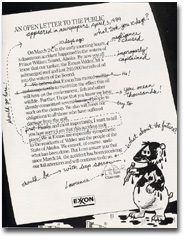|
By E. Bruce Harrison
What CEO, with a successful financial record running a company,
wants to be remembered largely for a single mistake in stakeholder
relationships?
Sadly, this was the ironic plight of Lawrence G. Rawl, chairman
and chief executive officer of Exxon Corporation.
The story of Rawl's life, at least the public story (which
goes into historical records and reference perpetuity), is
dominated by an event that has become the evil example, the
touchstone of political and environmental action commentary.
And yet, it is not only the event -- the spilling of oil
from the Exxon Valdez tanker accident in Alaska in 1989, and
the resulting environmental damage -- that forever clouds
the public memory of this business executive.
Rawl is also linked at a personal level with a decision made
within Exxon's management to hesitate before commenting on
the Valdez episode.
While there was some brief delay (one or two days) in dispatching
clean-up help to the area of the spill, Rawl waited for almost
a week before commenting and nearly three weeks before visiting
the Prince William Sound site and talking to citizens and
the media.

Rawl's letter with 'corrections'
by O'Dwyer's PR Services Report in 1989. Click
to enlarge. |
Environmental activists, editorial writers and a range of
public relations gurus all found Rawl guilty of neglect, disregard
and callous behavior. How could he not go see what his company
was involved in? How could he not go, express personal concern
and company commitment to a productive outcome?
A month after the oil leak, Rawl said, in an interview with
Fortune Magazine, "I've fished in Alaska, and I've been
to Valdez a number of times, so I know what it physically
looks like. From a public relations standpoint, it probably
would have been better had I gone up there."
Full-page ads in many newspapers carried an apology from
Exxon and its CEO.
By the time government declared the cleanup complete in 1992,
Exxon had spent an estimated $2 billion.
But it was that top-level hesitation - that no-comment stance,
that apparent malaise in management concern - that dimmed
Exxon's glow in stakeholder perception, affecting other companies
in the energy business as "Valdez" became the clear,
shrill cry for corporate punishment.
And it was this hesitation that entered the game book of
public relations as the primary example of what not to do
when disaster strikes.
Few executives repeat the mistake of mute delay in their
own, continuous cycle of relationships with critical stakeholders.
Every corporate and agency counselor now knows to get top
management to the scene of strife as soon as possible. They
know to express concern, and to commit to action.
These executives and their counselors owe a critical learning
to a good man -- family man, philanthropist, a Marine who
served in World War II, a skilled engineer who worked his
way up the ranks of a powerful company to become its competent
executive, more in the mold of the Jim Collins' Level 5 humble
leader than the charismatic star -- Lawrence G. Rawl, who
died this week at the age of 76, a victim of Alzheimer's disease
complications.
|
